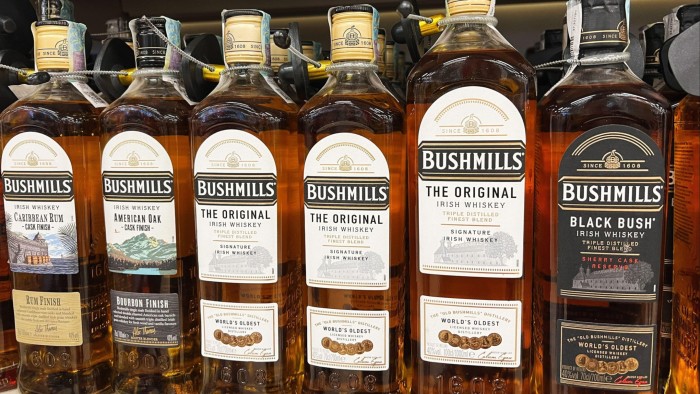Unlock the White House Watch newsletter for free
Your guide to what the 2024 US election means for Washington and the world
Distill grain anywhere on the island of Ireland and you can call it Irish whiskey. But under Donald Trump’s tariffs, the spirits made north of the border might get an advantage.
The US president has imposed a 10 per cent tariff on UK exports but 20 per cent on the EU, suggesting that whiskey sold into America from Northern Ireland will face a lower duty than that from the Republic.
However, as with many agrifood products, ingredients can be sourced on one side of the Irish border and processed on the other. This potentially complicates the tariff picture for an industry worth $1.1bn in revenue in the US if goods made with inputs from the Republic of Ireland are deemed to be of EU origin.
“We’re not 100 per cent sure what’s happening,” said Peter Lavery, director of Titanic Distilleries, a Belfast-based newcomer to the industry which recently announced plans to expand sales in the US.
Better-known Irish whiskey brands include Jameson in the Republic and Bushmills in Northern Ireland, but it is a growing industry with more than 40 distilleries now scattered across the island. The Irish Whiskey Association says nearly 4.7mn, 9-litre cases of Irish whiskey were sold in the US in 2003.
Whiskey produced fully in Northern Ireland, casked there and left for three years to mature is classified as a Northern Irish product, producers say.
However, many of the younger whiskey businesses in Northern Ireland buy the young product from the Republic before ageing and bottling it north of the border. “Beyond the headline rates, we don’t know which [tariff] applies,” said one industry figure. Lavery says Titanic buys from both the North and the Republic.
John Kelly, McConnell’s Irish Whisky chief, said the industry was working with the IWA and Spirits Europe “to get clarity . . . as quickly as possible”.
Exports from Northern Ireland are counted as UK exports but officials say whether or not EU content sourced in the Republic of Ireland would incur the EU tariff depends on how the US determines rules of origin.
“We will always act in the best interests of all UK businesses. This of course includes those in Northern Ireland which is a part of the UK customs territory and internal market,” said a UK government spokesperson.
The EU is evaluating how to respond but Trump has already said he will hit back with a 200 per cent tariff on European alcohol if Europe puts counter-tariffs on US whisky.
Adrian McLaughlin, who has developed two Northern Irish whiskey brands, Outwalker and Limavady, and is this month opening the island’s first “whiskey hotel” in a 19th-century property that belonged to Winston Churchill, said tariffs could drive US bourbon prices higher too.
As tariffs push up the price of Irish whiskey, “What does Bourbon do? Does Bourbon sit and retain its competitive advantage? Or does it say hold on — there’s a margin opportunity here, we’ll put our pricing up,” he said.
Eoin Ó Catháin, director of the Irish Whiskey Association which covers producers across the island, said engagement with the Irish government and EU continued in the hope of returning “to the reciprocal, zero-for-zero tariff environment which brought us such success”.
If the tariff differential between the UK and EU remained “it’s a huge advantage” but “we are obviously preparing for the worst,” Lavery said.
Irish Distillers, which owns Jameson and other Irish brands, declined to comment. Bushmills, owned by Mexico’s Becle, did not immediately respond.
Irish whiskey is one of the world’s fastest-growing categories of spirit. US consumption is expected to grow by 2 per cent in volume in 2023-28, according to IWSR, an alcohol data provider.
“This is not the end of the world,” said McLaughlin. “We’ll work it out.”




